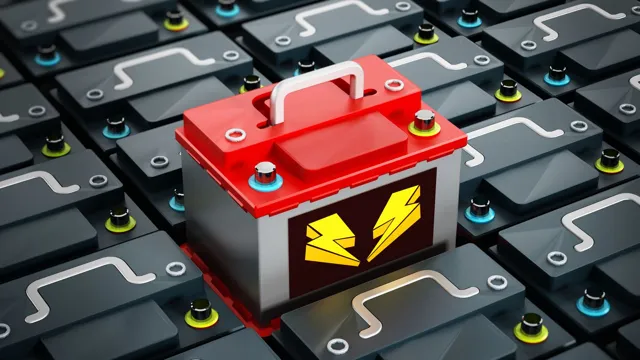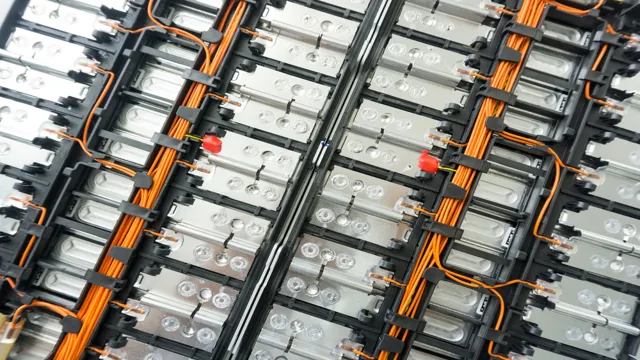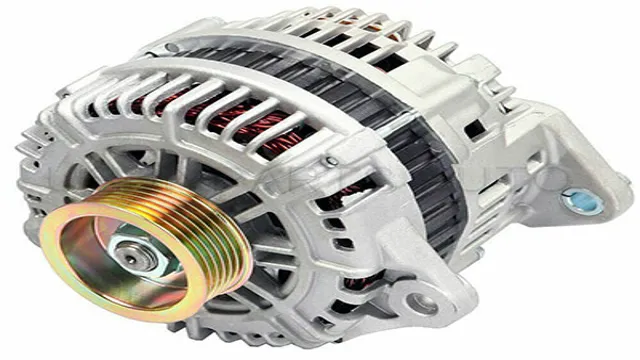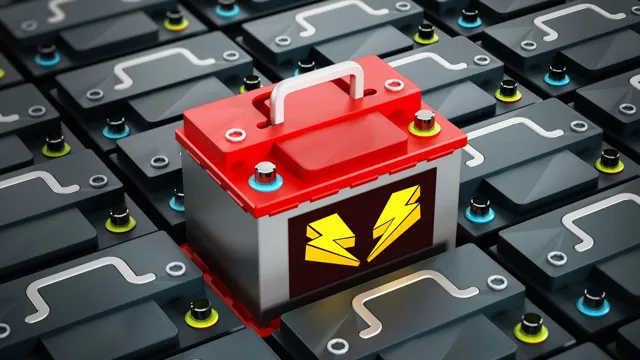The Power of Tomorrow: Revolutionizing Transportation with Electric Car Batteries of the Future
Electric cars have become a popular choice for environment-conscious individuals and companies. They are cleaner, more energy-efficient, and emit fewer pollutants than traditional gas-powered cars. However, the batteries that power these cars have always been a point of discussion.
The electric car batteries of the future will be the key to the growth and adoption of electric vehicles. But, what does the future hold for electric car batteries? Will they be able to provide longer ranges, faster charging, and increased durability? As the demand for electric cars increases, the automotive industry is investing heavily in new battery technologies. In the coming years, we can expect to see a significant breakthrough in battery technology, resulting in longer ranges and faster charging times.
Scientists and engineers are exploring new materials that can be used as electrodes in batteries, such as graphene and lithium-sulfur. These materials hold the promise of a power source that is more efficient and less expensive. Another aspect of the future of electric car batteries is the development of solid-state batteries.
Solid-state batteries hold the promise of a battery that is much safer than current lithium-ion batteries. Solid-state batteries use a solid electrolyte instead of the liquid electrolyte used in current lithium-ion batteries. This makes them less susceptible to problems like thermal runaway that cause fires and explosions.
In conclusion, the future of electric car batteries is exciting, and we can expect significant advances in their technology in the coming years. These advancements will result in longer ranges, faster charging times, and increased durability. The automotive industry is investing heavily in the development of new battery technologies, and it won’t be long before we see the benefits of these investments in our daily lives.
With more efficient and less expensive batteries, the electric car is certain to become the primary mode of transportation in the not-too-distant future.
Current State of Electric Car Batteries
When it comes to electric car batteries of the future, much of the technology is already available today. In fact, some automakers are already pushing the boundaries of what’s possible with electric vehicles. Batteries today are able to power electric vehicles for hundreds of miles on a single charge, and recharging times are rapidly decreasing.
However, there is still room for improvement in the field of electric car batteries. Researchers are working to develop batteries that are even more energy-dense, meaning they can store more energy in a smaller package. This would allow electric vehicles to travel even further on a single charge, making them more practical for long distance travel.
Additionally, new battery chemistries are being explored which have the potential to extend the lifespan of batteries and reduce their environmental impact. As we move closer to the future of electric cars, it’s likely that we’ll see even more advancements in battery technology that will make electric vehicles the preferred choice for drivers.
Lithium-ion Technology Domination
Lithium-ion batteries have come to dominate the market for electric cars due to their exceptional performance and reliability. The current state of these batteries is impressive, with major advancements being made in terms of energy density and overall efficiency. This means that electric vehicles are not only becoming more powerful, but they are also able to travel further on a single charge.
Lithium-ion batteries have already become the go-to technology for most automakers, with Tesla leading the charge in terms of innovation and adoption. While there are still some issues that need to be addressed, such as the environmental impact of battery production and disposal, it is clear that lithium-ion technology will continue to dominate the electric car market for years to come.

Battery Life and Charging Time Issues
When it comes to electric cars, one of the biggest concerns for many potential buyers is their battery life and charging time. However, the current state of electric car batteries is quite promising. Today’s batteries have higher energy densities and are becoming more and more efficient every year.
Electric vehicles now have a range of up to 400 miles on a single charge, making them feasible for long-distance travel. Charging times are also improving, with some models being able to charge to 80% capacity in just 30 minutes. Of course, there are still some limitations, but as technology continues to advance, it’s clear that electric cars are becoming more viable for everyday use.
It’s important to note that the current state of electric car batteries shows that the majority of electric cars can travel over 100 miles on a single charge, which is equivalent to most people’s daily needs. It’s exciting to think about what the future holds for electric car batteries and how they will continue to evolve and adapt to meet our needs.
Potential of Solid-State Batteries
Electric car batteries of the future are poised to experience a significant shift in technology, with solid-state batteries being touted as the potential game-changer. These batteries rely on the use of solid electrolytes instead of the liquid or gel-like electrolytes currently used in lithium-ion batteries. The solid-state approach offers several advantages, including increased energy density, longer cycle life, and faster charging times.
With more and more automakers looking to introduce fully electric vehicles and improve the performance of existing EVs, solid-state batteries are emerging as a promising solution. Despite the inherent challenges associated with developing solid-state batteries, carmakers and battery manufacturers are investing heavily in the technology as they see its potential to enable longer driving ranges and lighter and more compact battery packs. If solid-state batteries can live up to their promise, they may not only transform the EV market but also revolutionize energy storage applications in general.
What Are Solid-State Batteries?
Solid-state batteries are the next big innovation in energy storage technology. These batteries have a solid electrolyte instead of the liquid or gel electrolyte found in traditional lithium-ion batteries. This makes them safer, more stable, and capable of holding more energy in a smaller space.
Solid-state batteries also have the potential to charge more quickly and have a longer lifespan than their liquid counterparts. They are already being used in some niche applications, such as pacemakers and satellites, but their true potential lies in powering electric vehicles and other large-scale applications. While there are still some challenges to overcome, such as manufacturing costs and performance optimization, the potential benefits of this technology make it an exciting development to watch closely.
Benefits of Solid-State Batteries Over Lithium-ion
Solid-State Batteries As electric vehicles become more popular, there is a growing need for more advanced battery technology, and solid-state batteries offer a promising solution. Solid-state batteries use a solid electrolyte instead of the liquid electrolyte used in traditional lithium-ion batteries. This design eliminates the risk of leakage and improves safety.
Furthermore, solid-state batteries have the potential to store more energy in a smaller space, which means they can increase the range of electric vehicles and reduce the size of batteries while maintaining the same range. Solid-state batteries also have a longer lifespan and can be charged more quickly. Although there are still challenges to overcome before solid-state batteries can become commercially viable, they represent a significant step forward in battery technology.
With further development and innovation, solid-state batteries could revolutionize the way we power our devices and vehicles.
Challenges in Commercializing Solid-State Batteries
Solid-State Batteries Solid-state batteries have been considered an ideal alternative to conventional lithium-ion batteries due to their higher energy density, longer lifespan, and improved safety. However, commercializing solid-state batteries presents a significant challenge due to issues related to production costs, manufacturing scalability, and material availability. Solid-state batteries contain complex and expensive materials that are difficult to obtain, making their manufacture prohibitively expensive.
The development of scalable production methods for these batteries has been slow, and the costs have not yet been reduced to a level that would make them competitive with conventional batteries. Nevertheless, research into solid-state batteries continues to push the boundaries of technological advancement in the energy storage industry, and it is hoped that cost-effective and scalable solutions can be developed that will bring their numerous benefits to consumers.
Other Emerging Battery Technologies
As electric cars become more prevalent, there is a growing need for better battery technology that can handle longer ranges and quicker charging times. While lithium-ion batteries currently reign supreme in the electric car industry, there are several emerging technologies that could take over in the future. One such technology is solid-state batteries, which use solid electrodes instead of the liquid or gel-like material found in traditional batteries.
Solid-state batteries have the potential to store more energy, last longer, and charge faster than traditional lithium-ion batteries. Another emerging technology is metal-air batteries, which use oxygen to generate electricity. Metal-air batteries have the potential to store even more energy than solid-state batteries, but they are still under development and face challenges such as short lifespans and high costs.
Overall, the electric car batteries of the future will likely be a combination of several emerging technologies, including solid-state and metal-air batteries, as well as improvements to existing lithium-ion technology.
Lithium-sulfur Batteries – A Challenger to Lithium-ion?
While lithium-ion batteries are considered the industry standard, other emerging battery technologies such as lithium-sulfur batteries are beginning to challenge their dominance. Lithium-sulfur batteries have the potential to offer higher energy density and lower costs compared to their lithium-ion counterparts. This is because sulfur is abundant and inexpensive, and lithium-sulfur batteries can store more energy per volume.
However, there are still several challenges that need to be overcome before these batteries become commercially viable, such as their limited lifespan and poor performance in colder temperatures. Overall, lithium-sulfur batteries show promise as a challenger to lithium-ion batteries, but more research and development are needed before they can become a widespread reality.
Metal-air Batteries – High Energy Density and Low Cost?
In addition to lithium-ion batteries, there are other emerging battery technologies, including metal-air batteries. These batteries use oxygen from the air to drive a chemical reaction, making them significantly lighter than conventional batteries because the cathode doesn’t need to carry its own oxidizer. Metal-air batteries are being studied for use in electric vehicles as they offer a high energy density and low cost per kWh, making them a promising option for powering long-range electric vehicles.
However, there are still challenges to be addressed, such as the limited cycle life and the potential for corrosion of the anode. With further development, metal-air batteries could become a viable alternative to lithium-ion batteries.
The Future Is Right Around the Corner
Electric car batteries of the future are poised to revolutionize the automotive industry as we know it. With advancements in technology reaching a fever pitch, it’s only a matter of time before we see electric cars that can drive twice as far on a single charge than they do today. These cutting-edge batteries will also be much faster to recharge and will be much more durable, making them even more cost-efficient and eco-friendly.
It’s impressive to think about the many ways in which electric car batteries of the future will transform the way we travel and interact with our environment. Who wouldn’t want to be a part of this exciting evolution?
Conclusion
In the not-too-distant future, electric car batteries will be as ubiquitous as smartphones. They’ll be cheaper, lighter, and more powerful than they are today, and they’ll allow us to travel further than ever before. So if you’re still driving a gas guzzler, it’s time to battery up and let go of the past.
Embrace the future of electric cars and join the revolution toward a cleaner, more sustainable future. After all, if it’s good enough for Elon Musk, it’s good enough for the rest of us.”
FAQs
What is the current state of electric car batteries?
Electric car batteries have come a long way in recent years, with increased energy density, longer lifetimes, and faster charging capabilities.
How do electric car batteries of the future differ from current technology?
The electric car batteries of the future are expected to have even higher energy densities, faster charging times, and longer lifetimes, making electric cars more practical and convenient for everyday use.
What types of materials are used in electric car batteries?
Electric car batteries typically use lithium-ion technology, which relies on lithium-based materials for energy storage.
Will electric car batteries ever be able to match the range of traditional gas-powered cars?
While range anxiety is still a concern for some consumers, advancements in electric car battery technology are expected to eventually allow for ranges that are comparable to those of gas-powered cars.




